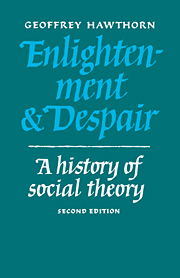Book contents
- Frontmatter
- Contents
- Preface
- Introduction
- 1 Enlightenment and doubt
- 2 History resolved by mind
- 3 History resolved by men
- 4 History resolved by laws I
- 5 History resolved by laws II
- 6 History resolved by laws III
- 7 History resolved by will
- 8 History doubted
- 9 History ignored
- 10 History unresolved
- Conclusion
- Bibliographies
- Index
2 - History resolved by mind
Published online by Cambridge University Press: 18 September 2009
- Frontmatter
- Contents
- Preface
- Introduction
- 1 Enlightenment and doubt
- 2 History resolved by mind
- 3 History resolved by men
- 4 History resolved by laws I
- 5 History resolved by laws II
- 6 History resolved by laws III
- 7 History resolved by will
- 8 History doubted
- 9 History ignored
- 10 History unresolved
- Conclusion
- Bibliographies
- Index
Summary
kant was the one contemporary who took Rousseau absolutely seriously. Like Rousseau, he saw that ‘the one science man really needs is the one I teach, of how to occupy properly that place in creation that is assigned to man and how to learn from it what one must be in order to be a man’, and he believed that in Rousseau and Rousseau alone, that ‘Newton of the moral world’, lay the basis for such a science. Rousseau had shown, most clearly in the second Discourse, that what others had taken as the constants of human nature were to a great extent the products of society. In Emile and The Social Contract, however, he had argued that man did nevertheless have an inviolable moral sense, and that if he were to use it, freeing himself of the contingent contaminations of his social experience, he would be able to discern the correct law. It was this second argument that impressed Kant, who wished to put it on a more secure footing. His achievement was to have done so. In doing so, however, he freed himself completely from Rousseau's first argument. The result was a further dilemma. The Enlightenment's defence of its conviction that man was largely a product of society had been shown to rest on an epistemological muddle.
- Type
- Chapter
- Information
- Enlightenment and DespairA History of Social Theory, pp. 28 - 50Publisher: Cambridge University PressPrint publication year: 1987

